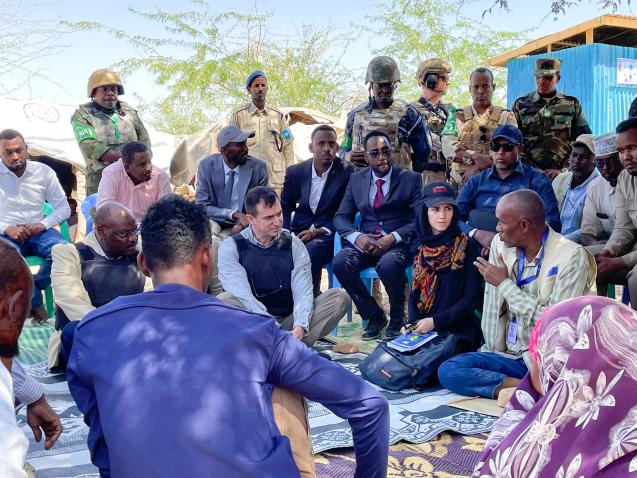27 January 2022 | UNDSS Comms
Drought and insecurity remain the main causes of displacement in Somalia, affecting nearly 7 million people. During a visit to Somalia last week, Under-Secretary-General (USG) Gilles Michaud reiterated UNDSS’s commitment to helping United Nations agencies, funds, and programmes provide life-saving assistance to those in need. When providing security advice to partners implementing relief operations, "we must be flexible and creative in our approach," the USG stated.
While in Somalia, the USG met with community leaders in an internally displaced people’s camp in Birmal, Beletweyne, to listen to their challenges and priorities. The leaders stated that rely on the international community’s assistance in their search for workable and long-lasting solutions.
When addressing the UN head of agencies in Mogadishu, the USG stressed the need for security to act as an enabler of their work. “We must be risk tolerant to ensure that those most in need are reached in time. The Ukraine crisis has shown that it is possible to offer support to the affected communities amid the high risks.” In explaining how UNDSS supported humanitarian missions in very high-risk areas in Ukraine, the USG added: "We were able to determine the hours of active shelling through in-depth analysis and sound judgement of the situation, and as a result, we cleared the mission to proceed at a period thought less likely to witness the fighting.”
The five-day Somalia visit was followed by a meeting with the European Union Civil Protection & Humanitarian Aid in Nairobi to discuss how to strengthen partnerships in and for Somalia. “Collaboration between UN Security and humanitarian and development actors is critical to reaching our ultimate clients who in this case are the people in need,” stated the USG. “Broadening strategic partnerships with regional and non-governmental actors is part of effective security risk management.” The department has since developed a USD 14 million funding appeal to strengthen resilience and response to emergencies.
Separately, in a first leg of his trip before Somalia, the USG met with the President of the transitional government in Burkina Faso to discuss ways of restoring constructive working relationships, following adjustments to the UN’s security posture in the capital.
Over the past few years, Burkina Faso has experienced political unrest and terrorist attacks that have forced at least a million people to flee their homes. The United Nations is working with various government agencies to assist the affected populations. This entails addressing the primary causes of conflict through politically sensitive programming, providing support for capacity-building efforts, and promoting political stability through national reconciliation, and regional cooperation.
The USG also held informal forums and town halls with the integrated security workforce throughout the visits. "We are in the business of giving our stakeholders the best advice we can, and it can never begin with a no. It's important to understand their goals and collaborate with them to create solutions,” the USG said during one of the sessions. “If we are to enable programmes in very high-risk areas, we should not over rely on the frequency of past security incidents as a criterion for not carrying out programmes. In Ukraine, we are constantly developing mission security clearances that are adapted to the current situation to plan for implementation of critical activities. This has proved a success.”

